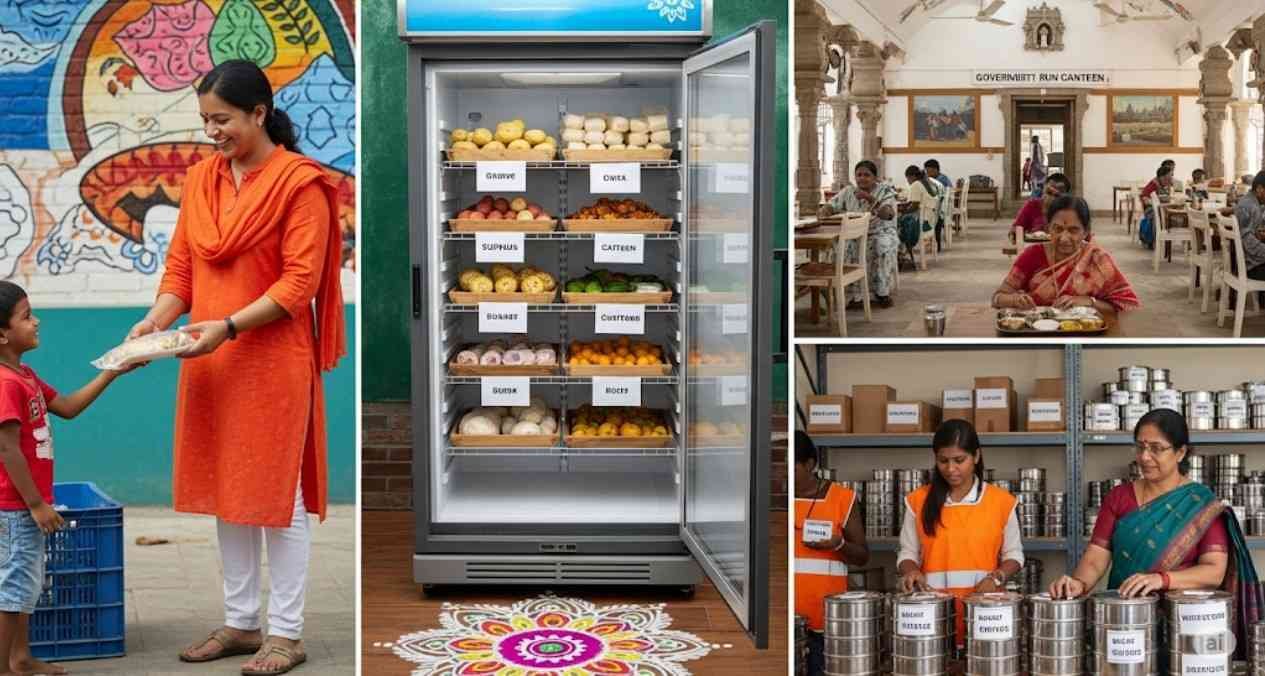Table of Contents
- Introduction
- 1. Government-Backed Food Redistribution Initiatives in India
- 2. Food Banking Networks as Food Redistribution Initiatives in India
- 3. State-Level and Community-Led Food Redistribution Initiatives
- 4. Reshine Organisation’s Role in Food Redistribution Initiatives in India
- 5. The Urgency Behind These Initiatives: Food Waste vs Hunger in India
- Final Thoughts: From Surplus to Support
Introduction
Food redistribution initiatives in India are tackling hunger and food waste at multiple levels. The country has a multifaceted approach, ranging from large-scale government schemes to grassroots efforts by NGOs and communities. These food redistribution initiatives in India aim to reduce food insecurity and make sure surplus or subsidised food reaches people in need.
1. Government-Backed Food Redistribution Initiatives in India
The Indian government plays a central role in food redistribution through various policies and infrastructure-led programs. These initiatives are not only designed to ensure food access for vulnerable populations but also to minimise food loss across the supply chain.
National Food Security Act (NFSA), 2013
A cornerstone of India’s fight against hunger, the National Food Security Act (NFSA) — also known as the Right to Food Act — legally entitles around two-thirds of the population to subsidised food grains.
It brings together multiple food security programs under one umbrella, including:
- Public Distribution System (PDS)
- Mid-Day Meal Scheme
- Integrated Child Development Services (ICDS)
Additionally, the Act ensures maternity entitlements, offering daily free cereals to pregnant women, lactating mothers, and young children. These schemes not only distribute food but also utilise surplus efficiently, reducing waste while improving nutrition outcomes.
Food Corporation of India (FCI)
Established in 1965, the Food Corporation of India ensures the procurement, storage, and distribution of food grains. By managing reserves and feeding government-backed programs, the FCI is a backbone of India’s food redistribution system.
Save Food, Share Food, Share Joy
Launched as a government-supported awareness movement, this initiative encourages citizens, businesses, and institutions to donate surplus food. It connects them with NGOs and food banks to ensure safe, hygienic redistribution.
Indian Food Sharing Alliance (IFSA)
The Indian Food Sharing Alliance, led by FSSAI in partnership with food banks, focuses on rescuing edible surplus food. It promotes cross-sector collaboration between private food businesses and non-profits, ensuring surplus is distributed to the needy instead of being wasted.
Guidelines on Food Recovery & Safe Food Donation
To support safe food donation, the FSSAI has issued detailed guidelines. These clarify the legal framework for food businesses, hotels, caterers, and manufacturers to donate unsold but safe-to-eat food, reducing hesitation and promoting compliance.
Infrastructure Support via Allied Schemes
While not directly redistribution programs, several government schemes help minimise post-harvest loss and make surplus food available for redistribution:
- Pradhan Mantri Kisan Sampada Yojana (PMKSY): Supports cold chains and food processing units.
- Integrated Cold Chain and Value Addition Infrastructure Scheme: Builds farm-to-consumer cold chains.
- Rural Godown Scheme: Improves rural storage to reduce spoilage and facilitate redistribution.
2. Food Banking Networks as Food Redistribution Initiatives in India
Beyond government policies, food redistribution initiatives in India also thrive through organised networks that recover surplus food from the private sector and deliver it to those in need.
India Food Banking Network (IFBN)
The India Food Banking Network (IFBN) plays a vital role in connecting surplus food from manufacturers and suppliers with people facing hunger. It targets large volumes of packaged food and grains that would otherwise go to waste due to overproduction, near-expiry dates, or slow-moving stock.
IFBN collects this surplus inventory from company warehouses and redirects it to verified non-profit institutions. These include:
- Schools for underprivileged children
- Orphanages and old-age homes
- Homeless shelters and charitable hospitals
- Low-income and vulnerable communities
This initiative prevents both food and financial waste. It also helps organisations free up valuable warehouse space while avoiding the environmental cost of food disposal.
IFBN’s impact is nationwide, with:
- Over 54 operational food banks
- 150+ network partners
- Presence across 60 hub cities in India
By creating a bridge between surplus and scarcity, IFBN is scaling structured food redistribution in both rural and urban areas.
3. State-Level and Community-Led Food Redistribution Initiatives
Alongside national programs and food banking networks, several state and local food redistribution initiatives in India are making a strong grassroots impact. These efforts are often run by state governments, foundations, or community volunteers who ensure that no edible food is wasted.
Indira Canteens – Karnataka
Launched by the Karnataka government, Indira Canteens provide breakfast, lunch, and dinner at highly subsidised rates. The goal is simple: no one should go hungry due to poverty. These canteens help reduce hunger in urban areas while ensuring access to nutritious meals for all.
Nalabothu Foundation – Andhra Pradesh
This foundation plays a key role in redistributing excess food from households, restaurants, events, offices, and canteens. Volunteers collect the surplus and deliver it to the homeless, daily wage workers, and low-income communities. It’s a strong example of citizen-led food rescue in action.
Amma Unavagam – Tamil Nadu
Popularly known as Mother’s Canteen, this initiative by the Tamil Nadu government offers low-cost, hygienic meals across the state. It serves thousands daily, especially elderly citizens, working-class people, and migrants. The model ensures access to hot food while preventing kitchen surplus from going to waste.
Food Bank (Royapettah) – Chennai
This charitable trust operates a local food recovery program, collecting surplus food from weddings, hotels, and events within a 5–6 km radius. The food is quickly distributed to underprivileged communities nearby, making it a hyper-local, zero-waste solution.
Ayyamittu Unn – Chennai
A project by The Public Foundation, this initiative places community fridges in public spaces where citizens can leave excess food. Anyone in need can pick it up, maintaining dignity while preventing waste. It builds a culture of sharing and empathy within urban neighbourhoods.
RYA Madras Metro – Chennai Food Bank
One of Chennai’s most consistent food donors, this food bank collects grains and staples from local donors and distributes them to the poor. Their structured approach ensures that donated items reach beneficiaries efficiently and safely.
4. Reshine Organisation’s Role in Food Redistribution Initiatives in India
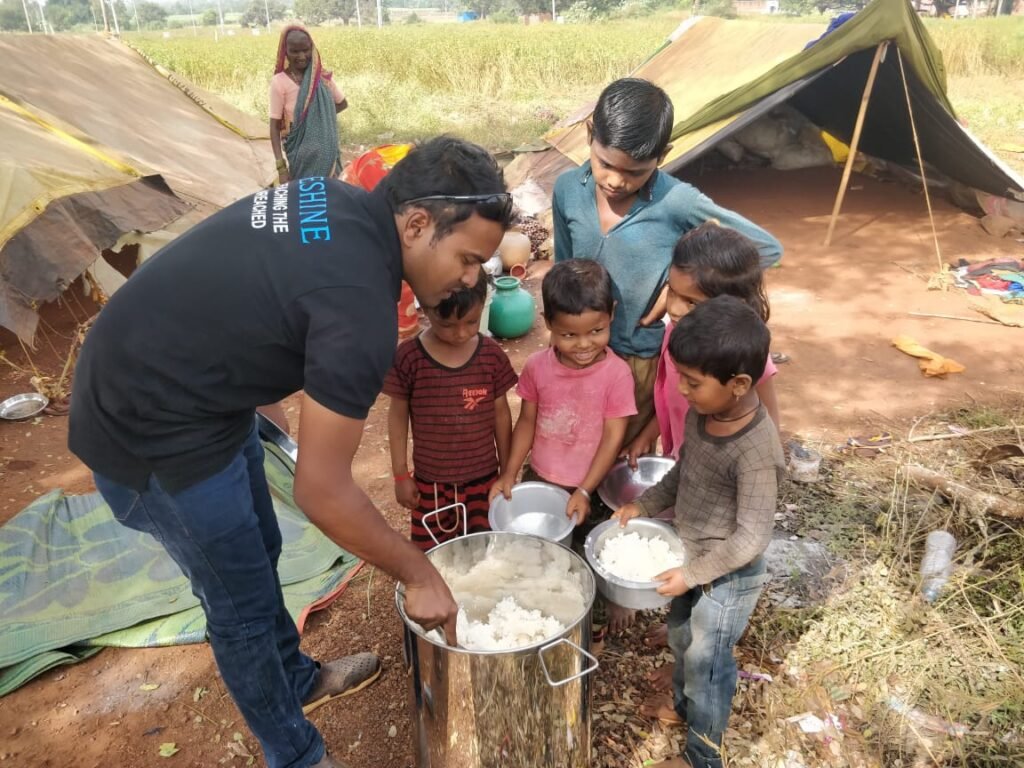
Among the many food redistribution initiatives in India, Reshine Organisation stands out for its data-driven, community-centric approach to reducing food waste and feeding the hungry.
Reshine partners with corporate kitchens, food manufacturers, restaurants, and event organizers to collect surplus food that is still safe and nutritious. This food is then quickly redistributed to local NGOs, shelters, and underserved communities.
What sets Reshine apart:
- Tech-enabled food tracking ensures traceability from donation to delivery
- Real-time logistics make redistribution swift and safe
- Impact reporting allows partners to see the results of their food contributions
- Focus on hygiene, quality, and compliance to meet FSSAI and ESG standards
With every meal saved and shared, Reshine is turning excess into opportunity—building a more equitable and sustainable food system in India.
To learn more about how your organisation can make a difference, explore Reshine’s donation partnerships or how we ensure food safety in our process.
5. The Urgency Behind These Initiatives: Food Waste vs Hunger in India
All these food redistribution initiatives in India are part of a larger battle — one against staggering levels of food waste and hunger.
India is the second-largest food waster globally, discarding nearly 78 million tonnes of food every year. This waste occurs across multiple stages:
- Households contribute to around 61% of global food waste
- The retail and hospitality sector alone wastes over 22 million tonnes annually
Meanwhile, over 200 million Indians go hungry every day.
This contrast between surplus and scarcity underscores the need for systemic reform. Solving India’s food crisis isn’t just about redistribution — it demands a multi-pronged approach that includes:
- Policy reforms and government intervention
- Corporate accountability and food rescue partnerships
- Public awareness and behavioural change at the household level
Reducing food waste not only improves food access but also lowers carbon emissions and eases the strain on natural resources.
Final Thoughts: From Surplus to Support
The scale and diversity of food redistribution initiatives in India reflect a growing commitment to feeding people, not landfills. From national policies to community fridges and digital food banks, India is building the foundations of a circular, hunger-free food economy.
At the heart of this movement is shared responsibility — between governments, businesses, NGOs, and individuals.
Want to Make a Difference?
Partner with Reshine Organisation to donate your surplus food safely, transparently, and impactfully.
Join the mission to reduce food waste and ensure no meal goes to waste while millions go hungry.

